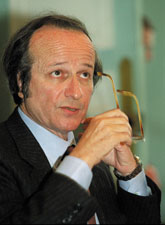URL: http://www.nature.com/cgi-taf/DynaPage.taf?file=/nature/journal/v408/n6813/full/408629b0_fs.html
Date accessed: 31 January 2001
Nature 408, 629 (2000) © Macmillan Publishers Ltd.
![]() 07
December 2000
07
December 2000
DECLAN BUTLER [PARIS] The French government is to submit a bioethics
bill to parliament that would lift its ban on human embryo research. The decision was widely expected, but some observers are surprised that the
bill does not expressly prohibit therapeutic cloning of human embryos to create
embryonic stem cells. Last month, advisers to the European Union concluded that
such a move would be "premature" (see Nature
408, 277; 2000).
Research minister Schwartzenberg will not rule out cloning. The bill — an update of France's 1994 bioethics legislation — would allow
research on embryos left over from in vitro fertilization procedures.
Research would be restricted to embryos less then 6–7 days old and to
circumstances in which no effective alternatives existed. Protocols would be evaluated and overseen by a proposed new
government-appointed body. This would be responsible for human reproduction,
developmental biology and genetics, and predictive medicine. The bill has been drafted largely by the pro-science research ministry.
Government officials predict that it will face a rough ride through the
conservative senate, and perhaps even the parliament, where a Socialist-led
coalition holds a majority. Opponents will argue that creating embryos for research runs counter to the
European convention on bioethics, which France has signed, and that the proposed
therapeutic cloning provisions would prevent France from ever ratifying the
convention. Others say that the bill is calculated to defer difficult decisions.
"The new authority will rule on a case-by-case basis, meaning that
decisions will be postponed until four or five years down the line," says
one official.
But the bill will state that it should "not be excluded a priori",
says Roger-Gérard Schwartzenberg, the research minister and chief sponsor of
the measure, as it may become necessary should other techniques fail. He points
out that cells or tissues derived from embryonic stem cells produced by cloning
for transplantation would not be rejected by the patient's body.
AFP

Category: 31. Stem Cells